Day 1
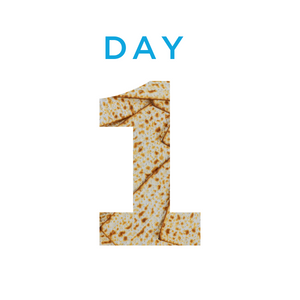
Seeing Injustice
On this, the first day of Passover, we learn from the biblical midwives of our story:
“The king of Egypt spoke to the Hebrew midwives, one of whom was named Shiphrah and the other Puah, saying, ‘When you deliver the Hebrew women, look at the birthstool. If it is a boy, kill him; if it is a girl, let her live.’ The midwives, fearing God, did not do as the king of Egypt had told them; they let the boys live.” (Exodus 1:15-17)
The Jewish value that prompted Shiphrah and Puah to action is tzedek, righteousness or justice. Two often quoted texts describe this Jewish imperative:
“Justice, justice shall you pursue so that you may live and inherit the Land that Adonai, your God, will give to you.” (Deuteronomy 16:20)
“God has told you what is good and what God requires of you: to do justice, love mercy and walk humbly with your God.” (Micah 6:8)
Judging others fairly, securing equitable treatment for all, and ensuring our righteous treatment of others is how we fulfill these biblical mandates. Our sages emphasize this value and suggest that God even desires it over compassion. This should move us to action and not stand silent in the face of oppression of any people or individual wronged in any way.
Consider different scenarios in which you have or might have an opportunity to practice tzedek. Discuss with your family or friends.
Consider visiting the Religious Action Center to explore their advocacy efforts for justice. What steps will you take to pursue justice like Shiphrah and Puah?
Day 2
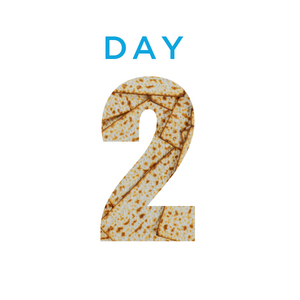
Responsibility For Others
We continue on the second day of Passover with a “grown up” Moses:
“Sometime after, when Moses had grown up, he went out to his kinsfolk and witnessed their labors. He saw an Egyptian beating a Hebrew, one of his kinsfolk. He turned this way and that and, seeing no one about, he struck down [read: killed] the Egyptian and hid him in the sand. When he went out the next day, he found two Hebrews fighting; so he said to the offender, ‘Why do you strike your fellow?’ He retorted, ‘Who made you chief and ruler over us? Do you mean to kill me as you killed the Egyptian?’ Moses was frightened, and thought:Then the matter is known! When Pharaoh learned of the matter, he sought to kill Moses; but Moses fled from Pharaoh.” (Exodus 2:11-15)
One thing that we can focus on in this densely packed section of Torah is Moses’s relationships with the others in this story and how he may (or may not) have felt a responsibility to the others. The Hebrew word for responsibility is achariyut, which is our value for today, and there are two important words in these verses that help us focus on this value.
- Kinsfolk– אֶחָיו – ehchav – Literally: “His brother”
- Fellow– רֵעֶֽךָ – rey’echa – Literally: “Your companion” or “your friend”
Moses witnesses two violent scenarios and has very different responses. First, he witnesses an Egyptian beating a Hebrew. Since Moses is born a Hebrew but raised in Pharaoh’s palace, it is possible that he could have an affinity for either. However, we read that Moses recognizes the Hebrew slave as his kin. Was Moses raised knowing that he was Hebrew-born? Torah doesn’t say. Nevertheless, Moses sees this injustice happening to his kinsfolk, literally “to his brother,” and has the urge to stand up and defend him by striking the Egyptian, presumably to death.
The next day, Moses finds two of his kinsfolk fighting. This time, Moses responds differently. Instead of physically intervening, he merely asks, “why do you strike your fellow?” This use of the word “fellow” shows us that Moses believes these two Hebrews, his kinsfolk, should not be acting this way. Moses believes in the Talmudic dictum kol yisrael arevim zeh bazeh– all of Israel is responsible for one another. The word Moses uses to express the relationship between these two Hebrews, rey’echa, is the word used throughout Torah to connote an expected positive relationship.
- In the story of the Tower of Babel, the workers use this term when they unite to build a tower to the heavens;
- This word is used repeatedly in the 10 Commandments: do not bear false witness against your fellow, and do not covet your fellow’s house;
- This word is used in Leviticus 19, the section called The Holiness Code, when we are taught to “love your neighbor as yourself.”
Through his words and actions, Moses teaches us that our closeness to someone may affect our feeling of responsibility towards them.
How do your feelings for someone affect your treatment of them? Take some time to consider this. Have you ever treated someone more harshly than they deserved? Have you been more lenient or forgiving than you should have been? What message do your words and actions convey?
Create a code of conduct. You may wish to do this for yourself, writing a letter of your self-expectations for your relationships that you may return to year after year to hold yourself accountable. Or, as a family or with the people you live, create a code of conduct to which you all agree to adhere that will foster a tone of mutual respect and consideration and strengthen your relationships.
Day 3
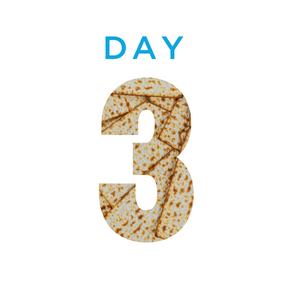
Finding Miracles & Mindfulness
Our voyage continues on day three, where it’s necessary to slow down to notice what is essential to move forward.
Moses’s observant nature in the Torah, the first five books of the Bible, helped him witness a miracle. That miracle would make him realize his bigger purpose to free the Israelites from Egypt.
As he led his sheep around a mountain to graze, Moses noticed flames engulfed a large bush nearby. He realized the fire did not harm the bush, became curious, and approached the bush.
“And God called to him from the midst of the bush, and said: Moses, Moses. And [Moses] said: Here I am.” (Exodus 3:4)
God told Moses to stop moving closer and instructed Moses to take off his shoes because Moses stood on holy land. God saw how Egyptians oppressed the Israelites and advised Moses to get the Israelites out of Egypt.
“And now, go, and I will send you to Pharaoh, and you will take out My people, the children of Israel, from Egypt.” (Exodus 3:10)
Moses witnessed a miracle in the burning bush that gave him a purpose and greater intention. Some find this in the Jewish value of tikkun middot – awareness of character habits and living with greater meaning and a sense of sacred purpose. One way to achieve this is by practicing mindfulness.
Mindfulness is a type of meditation where you focus on being very aware of what you are sensing and feeling in the moment, according to the Mayo Clinic. Practicing mindfulness can help you squash negative thoughts, stress, and anxiety. With a clear mind, it’s easier to find the small miracles in your life.
How could you practice mindfulness daily? Weekly? Monthly? Talk about this with your family.
Here are some tips:
- Be attentive. Life is extremely busy. Try to find time, even if it’s just a moment, to slow down and notice what’s around you. For example, you could practice this by noticing all of the flavors in your favorite snack.
- Breathe. When you feel stressed, take a deep breath and close your eyes. Focus on how your breath feels when you inhale and when you exhale. Even a few minutes of this practice can reduce stress.
Try this 10-minute guided meditation: https://www.youtube.com/watch?v=lS0kcSNlULw
Day 4
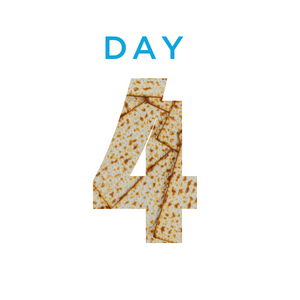
Sacred Partnerships
On the fourth day of Passover, we find Moses and Aaron uniting for a great adventure with God’s help:
“God said to Aaron, ‘Go to meet Moses in the wilderness.’ He went and met him at the mountain of God, and he kissed him. Moses told Aaron about all the things that God had committed to him and all the signs about which God had instructed him. Then Moses and Aaron went and assembled all the elders of the Israelites. Aaron repeated all the words that God had spoken to Moses, and he performed the signs in the sight of the people, and the people were convinced. When they heard that God had taken note of the Israelites and that God had seen their plight, they bowed low in homage.” (Exodus 4:27-31)
This moment is an example of the Jewish value of shutafut, partnership. Based on this text, what do you feel are the defining characteristics of this partnership?
Judaism is deeply attuned to the importance of us doing our most sacred work in partnership with others. We know that partnerships can take many forms in our lives- work partners, life partners, etc. Below are three texts that speak to Judaism’s affinity for us seeking partnerships of all kinds:
“God said, ‘It is not good for a person to be alone; I will make a fitting helper for them.’” (Genesis 2:18)
“At a time that the community is encompassed by trouble, a person should not say, ‘I will go to my own house and eat and drink and peace to you.’ Rather, a person should suffer with the community, as we find with Moses, our teacher, who caused himself to suffer with his congregation…Rather, this is what Moses said: ‘Since the Israelites are suffering, I will be with them in their suffering. And anyone who suffers with the community will merit to enjoy comforting times with the community in the future.’” (Taanit 11a)
“There are eight levels of tzedakah, each one greater than the other. The greatest level, higher than all the rest, is to fortify a fellow Jew and give them a gift, a loan, form with them a partnership, or find work for them, until they are strong enough so that they do not need to ask others [for sustenance].” (Mishneh Torah, Gifts to the Poor 10:7)
Consider the values and characteristics of each of these partnerships. How do any of these texts strengthen or change your understanding of Moses’s, Aaron’s, and God’s partnership?
Activity: Take five minutes today and write a note of gratitude to someone whom you consider to be your partner. Take note of your personal feelings while writing the note, after sending the note, and while your partner reacts to your note.
Day 5
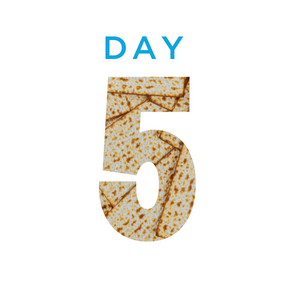
The Importance of a Good Snack
MATERIAL NEEDED: One snack…really. Don’t continue reading until you have a delicious, healthy snack in hand!
Our journey on day five begins at a very familiar moment in the story of the Exodus from Egypt:
“[Pharaoh] summoned Moses and Aaron in the night and said, “Up, depart from among my people, you and the Israelites with you! Go, worship [your] God as you said! Take also your flocks and your herds, as you said, and begone! And may you bring a blessing upon me also!” …So the people took their dough before it was leavened, their kneading bowls wrapped in their cloaks upon their shoulders…And they baked unleavened cakes of the dough that they had taken out of Egypt, for it was not leavened, since they had been driven out of Egypt and could not delay; nor had they prepared any provisions for themselves.” (Exodus 12:31, 32, 34, and 39)
In their haste to leave Egypt, our ancestors didn’t have time to take care of every important task on a typical “To Do List” before their journey. They didn’t know where they were going, nor did they know how long it would take. They only knew they needed to go immediately. But fear not, because our ancestors brought travel snacks! Well, they brought what they needed to make some travel snacks (matzah).
This moment in our journey is all about the Jewish value of kemach (lit. “flour”), which our tradition uses to signify physical sustenance- aka snacks.
When we are on a journey, whether physically or spiritually, we need to make sure we have what we need to sustain ourselves. The 2nd century Rabbi Eliezer ben Azariyah helps us greatly by teaching in Mishneh, Pirke Avot 3:17: Im ein kemach, ein Torah; im ein Torah, ein kemach. If there is no “snack”, there is no Torah; if there is no Torah, there is no “snack”. If a snack nurtures our bodies, then Torah nurtures our souls.
This isn’t breaking news. Our ancestors taught we should distribute roasted grains and nuts on Passover to children before the seder so that they will not sleep and so they will ask the four questions (Pesachim 109a). We know very well that a good snack can help us focus to perform the task at hand, which makes us hungry again from accomplishing our task.
Rabbi Eliezar sets up a cycle that is tailor made to nurture both our bodies and our souls. One does not come before the other. They must be accounted for at all times. We must nurture ourselves physically and spiritually simultaneously. As is said in Hebrew, בְּתֵאָבוֹן, b’tey’avon, have a “good appetite.” Enjoy your snack.
Day 6
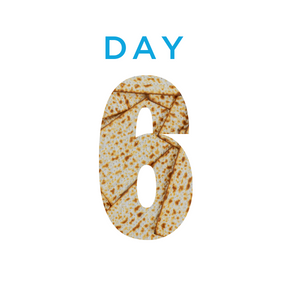
Going Out on a Limb
When we are nearly at the end of our Passover story, the Israelites are being chased by Pharaoh and reach the Sea of Reeds. The Israelites have had the taste of freedom for just a moment in time. They face the choice of an overwhelming sea in front of them or to turn back and become enslaved to Pharaoh once more.
“Then God said to Moses, Why do you cry out to Me? Tell the Israelites to go forward.’” (Exodus 14:15)
Moses then raises his arms and parts the sea. However, a midrash, a rabbinical story, says when the Children of Israel came to the edge of the sea, the water first refused to part. Each one said, “I will not be the first to enter.” A person named Nachshon leaped into the sea, plunging into its waves. The sea did not part for him until he had waded into it up to his nose; only then did it become dry land.
Now, as then, redemption cannot come unless we take that first step. As you contemplate the steps you are willing to take, we invite you to contribute to this collective expression of courage HERE.
French painter Henri Matisse famously said, “Creativity takes courage.” His flat shapes, expressive abstractions, and vivid use of color were highly controversial in his day. Today Matisse’s work is treasured and appreciated and a source of inspiration for artists worldwide.
Often, the things worth doing in our lives take some degree of courage. May you be like Nachshon, a person who is willing to step forward in the face of fear to better your life and the lives of others.
“I learned that courage was not the absence of fear, but the triumph over it. The brave man is not he who does not feel afraid, but he who conquers that fear.” – Nelson Mandela.
Day 7
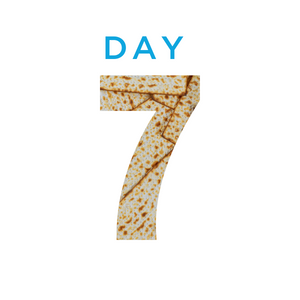
Continuing the Journey
On the seventh and final day of Passover, we celebrate Miriam. Miriam was Moses’s older sister who looked out for his safety when he was a baby floating in a basket in the Nile river. She watched as Pharaoh’s daughter rescued him and adopted him as her son. Miriam continued to have an instrumental role in our story. Along with Moses and Aaron, she led the people to freedom.
“For the horses of Pharaoh, with his chariots and horsemen, went into the sea; and God turned back on them the waters of the sea; but the Israelites marched on dry ground in the midst of the sea. Then Miriam the prophetess, Aaron’s sister, took a timbrel in her hand, and all the women went out after her in dance with timbrels. And Miriam chanted for them: Sing to God, for God has triumphed gloriously; Horse and driver God has hurled into the sea.” (Exodus 15:19-21)
Our sages said that it is because of Miriam’s merit that a well followed the Israelites as they journeyed in the wilderness, providing water to sustain them (Ta’anit 9a:9).
Consider the miraculous nature of this story and the actions of our heroine. What does it take to call someone to action in the face of their destruction? Like Moses and Aaron, Miriam faced death as she went against Pharaoh’s orders facilitating Moses’s survival as a baby and later helping the Israelites escape Egypt. What would encourage you to take such extreme action to save an entire people?
Judaism teaches that we must be mindful of the important balance of the needs of the individual and the needs of the community. While each person must tend to their own needs, we are taught not to put our individual needs before the needs of all others. When we act to better ourselves, we are cautioned to consider how our actions impact others and the community. Rabbi Hillel expressed this concept beautifully by saying:
If I am not for myself, who will be for me? And if I am only for myself, what am I? And if not now, when? (Avot 1:14)
Here in Cleveland, we have a history of risking personal safety to save people. The Underground Railroad ran through Cleveland and helped African-Americans escape slavery. Consider following in these footsteps to celebrate freedom. Travel the stops on the Cleveland Underground Railroad tour.
If seven days is not enough and you yearn for another ritual to light the path to freedom, we suggest you try a practice called Counting the Omer. It begins on the second night of Passover and continues to the holiday of Shavuot, when we celebrate the giving of the Torah (5 Books of Moses). This is the time of the barley harvest in the Land of Israel when people would bring sheaves to the Temple in Jerusalem in thanksgiving to God. This practice helps keep us accountable. Many Jews will focus on a different Jewish virtue each day of the counting as a way to better themselves (e.g. loving kindness, compassion, etc.). We are reminded that the journey from slavery to freedom and redemption is ongoing. May we never lose sight of our active role in this journey for all peoples. Learn more about this ritual counting HERE.
**Passover is a seven day holiday. However, many Jews celebrate the holiday for eight days. Historically, an eighth day was added as a safeguard to ensure the holiday’s observance at the correct time. More traditional Jews maintain this eighth day of observance, while more liberal Jews and Jews living in Israel celebrate the biblically prescribed seven days (See Exodus 12:15-18).